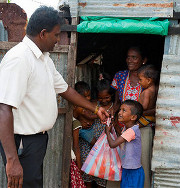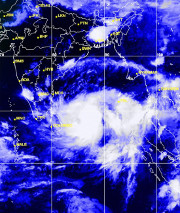
Burma (MNN) — Tropical Storm Mahasen may have been a mere "dress rehearsal' for Burma's Rohingya people.
Last week, we told you about the threat Cyclone Mahasen posed to vulnerable Rohingya existing on Burma's western shoreline. But thanks to prayer on both a local and global basis, Mahasen's force lessened, and it turned away from Burma.
With monsoon season right around the corner, your prayers are needed again.
Last year, Burma saw some of the worst monsoon flooding in years. At least 85,000 people fled affected areas, and some 200,000 people were affected nationwide. Burma's southern region was among the hardest hit, where over 600,000 acres of rice fields were swamped.
This year, concerns are being voiced for hundreds of thousands of stateless Rohingya living in Burma's western Arakan (Rakhine) state. Many are worried that the Rohingya's flimsy tent shelters won't hold up to heavy rains and severe flooding.
"They're barely able to put up some bamboo sticks and put some plastic over it, some shelter. All of a sudden, [there's] the monsoon season and flooding," says Gospel for Asia (GFA) founder KP Yohannan.
"Everything creates such a massive problem."
If things are so bad, couldn't the Rohingya just pick up and move somewhere else? Yohannan says it's not that easy.
"Only a few occasions in my life have I seen the plight of these people," Yohannan says. "When they leave everything, they lose everything.
"Just close your eyes and imagine: old people and old women, little kids, and pregnant wives, carrying little pots and pans on their head, [leaving only] with the clothes they wear…ending up in school grounds and other places."
The Rohingya aren't traveling like this by choice; they're often forced out by Buddhists, the majority religion. Last year, ethnic violence forced over 150,000 Rohingya into hiding.
The lucky ones found their way to makeshift camps–clusters of bamboo sticks barely resembling a structure, covered by tarpaulin, in low-lying rice fields.
"It is like a cattle shed: they are driven to places where normally no one wants to be," says Yohannan. "The suffering is immense; it's hard for us even to imagine."
Immediately following Mahasen's landfall in Bangladesh and parts of Burma, GFA missionaries started delivering food, clothing, and temporary shelter. GFA is preparing for at least six months of ongoing ministry in affected regions.
You can help by clicking here.
Pray GFA-supported national missionaries can show the Rohingya that there's still a reason to hope.
"The only thing that can really bring any kind of hope for people in times of despair is the Gospel of the Lord Jesus Christ," states Yohannan.
"[In] John 10:10, Jesus said Satan came to destroy and to kill, and that's what we're witnessing. Ask God to intervene; [this is] genuine spiritual warfare."

